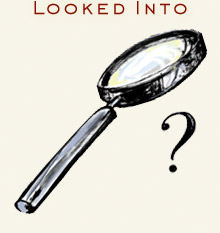Emdashes—Modern Times Between the Lines
The Basics:
About Emdashes | Email us
Ask the Librarians
Best of Emdashes: Hit Parade
A Web Comic: The Wavy Rule
Features & Columns:
Headline Shooter
On the Spot
Looked Into
Sempé Fi: Cover Art
Mad Men Recap Ritual Reading: This Week's High Point
Filed under: Looked Into Tagged: Chinese Wall, Christopher Lasch, Don Draper, Duck Phillips, Entertainment Weekly, James Wolcott, John Swansburg, Julia Turner, Lemondrop, Logan Hill, Mad Men, Mark Lisanti, Michael Agger, Movieline, New York magazine, New York Observer, S. J. Perelman, Sally Draper, Slate, Vanity Fair

Emily writes:
Of the assorted Mad Men recaps I read every week, New York magazine’s are often my favorite. I interrupt myself to say, though, that the first one I read each week, and very nearly hyperventilate while waiting for, is Mark Lisanti’s matchless, dirty Mad Men Power Rankings, which are less recaps than they are manic fanfic, or meta-dystopias, or thought balloons kidnapped from the dank shadows of the writers’ room.
Then, throughout the week, I savor the Slate TV Club dialogues, which I love; letter-writing and -answering is still such a civilized form, and the correspondents’ sign-offs always make me laugh. Plus, the Slate trio (Michael Agger, John Swansburg, and Julia Turner) often cite reader comments and research, which is classy. You’d be a fool to miss James Wolcott’s (and others’) recaps at Vanity Fair, which include a playful plaint on the weary burden of recapping that is, as a friend of mine says, “the stuff of an S. J. Perelman Greatest Hits.” In the same column, Wolcott writes, elegiacally, of Sally:I hate seeing Sally cry; there’s something so pure and defenseless about her plight. She’s either going to evolve into a saint forged in suffering or develop telekinetic powers and turn their next residence into a house of flying daggers, converting her mother into a lovely order of shish kabob. Either way, we’re pulling for you, Sally! Your tears shall not spill in vain!I also enjoy the Lemondrop recaps, which have an appealing carefree zest but are sometimes a little sloppy. I can wait a few episodes to catch up with the Movieline recaps and Entertainment Weekly’s “Mad Men Central,” though I relished EW’s “‘Mad Men’: Unpacking ‘The Suitcase.’” Correct me if I’m wrong, but is EW a couple of episodes behind? Think of the people, like me and Duck Phillips, prone to the shakes!
Anyway, back to the always expertly composed and deeply considered writing on the show from New York. I thought this was an especially elegant, and relevant—see the Observer’s recent instant classic “So Sorry To Do This! Flakiness Epidemic Sweeps Digital New York”—graf from Logan Hill this week:
This season, the show has become more critical of the actual conditions of Madison Avenue. Abe was the first character to really embody a hard-left critique of the ad world (only Midge’s bohemian critique came close) with his “Nuremberg on Madison Avenue” jeremiad. There are a whole lot of historians and sociologists, like David Montgomery (or Christopher Lasch, whose Haven in a Heartless World: The Family Besieged seems especially pertinent to this episode) who might be frustrated by the way a lot of the period arguments we fans have had about Mad Men — in terms of women in the office and work-life balance, and gender roles and so forth — tend to occlude the macro-level changes in the ways Americans work. We talk about how Betty’s a bad parent, and Don’s a bad parent, but rarely about how the way work — and, particularly, this kind of obsessive Manhattan work world — is eclipsing all other sorts of power and order, requiring and overtaking more and more of people’s values and lives. When, at a funeral, there’s more talk of money than religion, more talk of work trips than the journey to the afterlife, the show’s making a point.Read the rest. This is rewarding, satisfying television criticism. That’s not an implied slight to anyone else’s (I hate the blog idiom sometimes—it’s so binary), but here’s to Logan Hill for doing this so well. Meanwhile, can someone pay Mark Lisanti to blog all day? I’m sure he has better things to do, but it would make a major contribution to my quality of life.
See also: 5 Other Necessary Mad Men Tumblrs, from Movieline.



